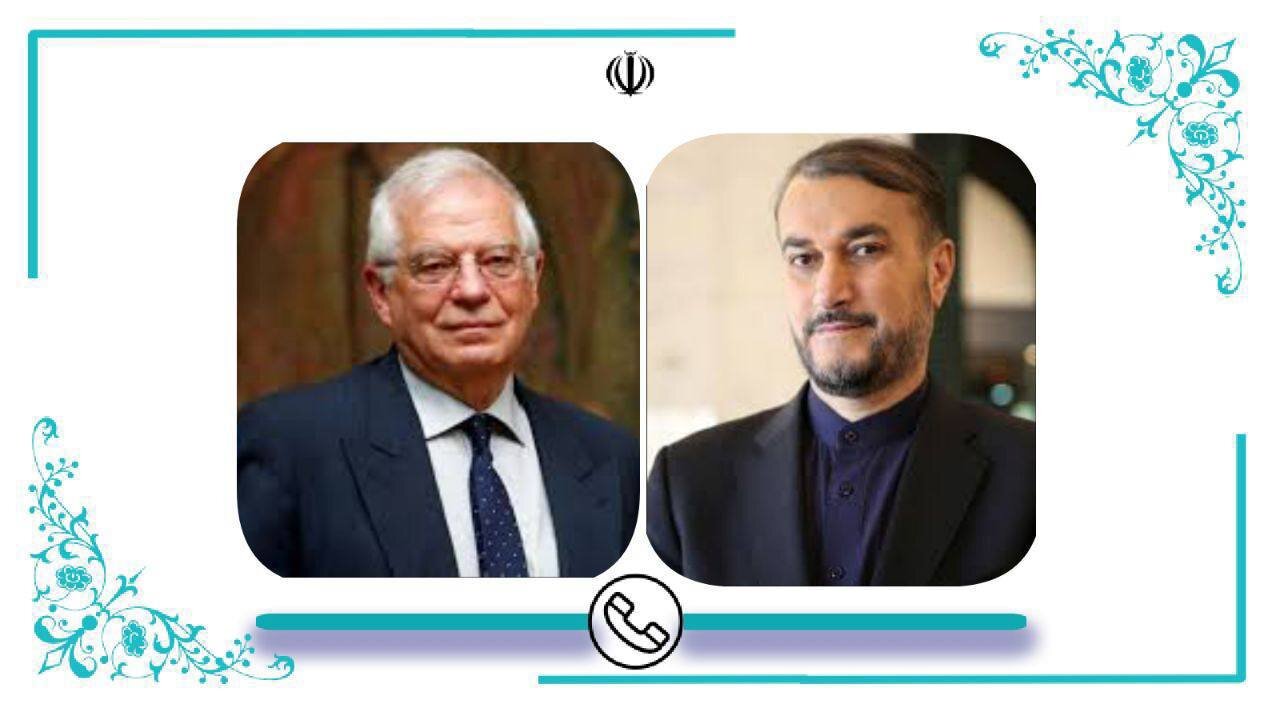Abdollahian, Borrell hold talks on Iran-IAEA co-op, human rights, sanctions, Ukraine war
Abdollahian says EU repeating ineffective sanctions policy, following double standards on human rights

TEHRAN- Iranian Foreign Minister Hossein Amir Abdollahian and Josep Borrell, the EU’s High Representative for Foreign Affairs and Security Policy, held phone talks late on Sunday over a variety of topics, including human rights, cooperation between Iran and the IAEA, sanctions on Iran, and the Ukraine war.
During the talks Amir Abdollahian called on the IAEA to take technical and non-political approaches, pointing to a number of initiatives devised jointly by Iran and the UN nuclear agency for the resolution of disputes over the Safeguards Agreement.
Highlighting the dialogue that has taken place between Iran and the IAEA in regards to the Safeguards Agreement, Amir Abdollahian said, “We are making arrangements for the (director general of the International Atomic Energy) Agency’s visit to Tehran and have joint initiatives on the agenda.”
The top Iranian diplomat underlined that if the UN nuclear agency acts in a technical and non-political manner, a framework for dealing with the issues may be achieved.
Amir Abdollahian also criticized some European countries for supporting pro-terrorist organizations living outside Iran, saying the overwhelming participation of Iranians in the Feb. 11 demonstrations marking the anniversary of the Islamic Revolution is an indication that the Islamic Republic enjoys public support.
Referring to the U.S.’s torn and out-of-date policy of sanctions against Iran, he added, “The European Union's conduct in recent months is the repeat of the ineffective policy of ex-U.S. president Trump which indicates the resumption of the double and implausible standards accompanied with instrumental use of human rights principles.”
Amir Abdollahian also emphasized that Iran has consistently advocated for a truce and diplomatic solutions to the Ukrainian conflict as he further emphasized the need to put an end to the violence in Ukraine.
“From Iran’s perspective, preserving countries’ territorial integrity would ensure enduring peace, like in Ukraine, and we have spared no effort to pursue a truce and achieve peace,” he said.
Borrell, for his part, voiced doubt that a truce can be reached in Ukraine in the upcoming weeks or perhaps months.
The EU foreign policy chief emphasized the necessity of continuing the conversations in order to advance the topics under discussion while highlighting the optimism for progress made in the course of collaboration between Iran and the IAEA.
Writing on his Twitter account, Abdollahian said, “Tonight on telephone with @JosepBorrellF discussed Iran-EU ties, JCPOA, Iran-IAEA cooperation and Ukraine developments. Emphasized that I.R. Iran relies upon its people and this was proven once again on February 11th (national day) this year.”
Borrell and Amir Abdollahian also spoke about other topics, including the negotiations to end sanctions against Iran and cooperation between Iran and the European Union.
Iran and the IAEA are now at odds over the Agency’s claims against Tehran’s peaceful nuclear activity.
These accusations came just as the Islamic Republic and other signatories to the 2015 Iran nuclear deal and the U.S. looked to be close to reaching an agreement on renewing the pact.
Iran has asserted that reaching an agreement on the resurrection of the nuclear accord is contingent upon the IAEA to abandon unsubstantiated claims over Iran’s nuclear program, insisting that without doing so, the Joint Comprehensive Plan of Action (JCPOA) has no purpose.
Furthermore, due to Washington’s staunch insistence on maintaining its hardline position of not agreeing to lift all the sanctions that were placed on the Islamic Republic by the Trump administration, the talks to save the JCPOA have been at a stalemate since August 2022.
